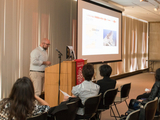Fellowships span disciplines, enable impactful research.
[This story is a repost from the UMBC News site]
The Office of the Vice President for Research (OVPR) has awarded Summer Faculty Fellowships (SFFs) to 11 faculty across disciplines. The SFF program supports non-tenured, tenure-track UMBC faculty pursuing research and scholarly projects during the summer. Supplemental funding for the program was provided by the College of Arts, Humanities, and Social Sciences (CAHSS) for an additional 11 awards. OVPR funded seven awards for CAHSS, two for the College of Natural and Mathematical Sciences (CNMS), and two for the College of Engineering and Information Technology (COEIT).
“UMBC is excited about the impactful scholarship which our Summer Faculty Fellowship recipients will be pursuing this summer,” says Vice President for Research Karl Steiner. “I am confident that many of these projects will lead to externally funded, long-term endeavors which will contribute significantly to the recipients’ respective disciplines.”
A brief description of each 2016 SFF project is found below:
Jasmine Abrams, assistant professor of psychology, will research how stress influences cardiovascular disease (CVD) risk among black women, a group that is disproportionately affected by the disease, to inform future research and prevention strategies.
Ian Anson, assistant professor of political science, was awarded SFF funding to investigate how media narratives shape citizens’ attributions of responsibility for national economic conditions.
William Blake, assistant professor of political science, will examine voting behavior on ballot measures and state constitutions to broaden theories of economic voting behavior.
Colleen Burge, assistant professor of marine biotechnology, was awarded funding through the SFF program to measure oyster immune responses to an emerging disease to be used a biomarkers for oyster health.
Eric Campbell, assistant professor of philosophy, received support to publish a journal article that explains subjectivism, the idea that a person’s reasons for action are justified by their desires and attitudes, is ultimately a question about how to conduct ethical discourse and explores why the quasi-realist strategy to save moral discourse is self-undermining.
Chris Curran, assistant professor of public policy, received SFF funding to study the influence of states, school boards, principals, teachers, and other stakeholders on school discipline policies while assessing variations across school populations. The results will inform policymakers as they work to improve equality in disciplinary outcomes for students.
Thania Muñoz Díaz, assistant professor of modern languages, linguistics, and intercultural communication, was awarded funding to support research on the representation of Mexican migration from the perspective of women, translation, and cultural memory.
Matthew Fagan, assistant professor of geography and environmental systems, received SFF funding to use aerial and satellite imagery from NASA’s G-LiHT imager to improve the ability to predict how forest structure and composition will respond to landscape fragmentation.
Bronwyn Hunter, assistant professor of psychology, received support to examine discrimination and rejection experiences among formerly incarcerated adults.
Renée Lambert-Brétière, assistant professor of modern languages, linguistics, and intercultural communication, was awarded funding through the SFF program to write a book that aims to empower indigenous people of Quebec to develop, manage, and maintain their own language documentation projects.
Jiyoon Lee, assistant professor of education, received SFF funding to investigate U.S. public school teachers’ knowledge, understanding, and competencies related to assessment in K-12 classrooms.
Tania Lizarazo, assistant professor of modern languages, linguistics, and intercultural communication, was awarded funding to reimagine and develop a digital storytelling project she collaborated on with activist women to capture visual narratives about survival in Columbia.
Daniel Lobo, assistant professor of biological sciences, will use SFF funding to address the problem of discovering bacterial integrated regulatory-metabolic networks involved in the degradation of carbon sources.
Susan McCully, assistant professor of theatre, received support to write a companion piece to her critically acclaimed production of Kerrmoor to be performed as a stand-alone tragedy, or as the second act of the longer play.
Elizabeth Patton, assistant professor of media and communication studies, was awarded SFF funding to research the politics of media representations of family, privacy, race, gender and class, the politics of media practices in relation to work and play, and the politics of space.
Bryce Peake, assistant professor of media and communication studies, received funding to complete a book project that examines the ways that media sciences and listening practices are historically implicated in British colonial forms of masculinity in Gibraltar.
Hamed Pirsiavash, assistant professor of computer science and electrical engineering, received an SFF to build a machine learning tool that can map sensory data from modalities such as natural images, clip art, and spatial text into a common semantic representation.
Sarah Sharp, assistant professor of visual arts, was awarded SFF funding to develop the “Whole Earth Codex,” a multi-component interactive sculptural artwork that complicates understanding of utopian communities.
Nathaniel Sinnot, assistant professor of theatre, received support to research methods to enhance the theatrical design process through computer programming and innovation.
Michelle Stites, assistant professor of education, was awarded funding through the SFF program to study mathematical interventions for students with learning disabilities.
Christine Yee, assistant professor of economics, received SFF funding to assess the impact of school accountability on the mental health of youth.
Meilin Yu, assistant professor of mechanical engineering, received support to understand the impact of turbulent flow physics on mechanisms of drag reduction in efficient fish locomotion.
For more information about the Summer Faculty Fellowship program, visit the SFF website.
Image: Bryce Peake presents his research at a Dresher Center Faculty Micro Talks event. Photo by Marlayna Demond ’11 for UMBC.
Tags:
Posted: March 8, 2016, 2:14 PM
